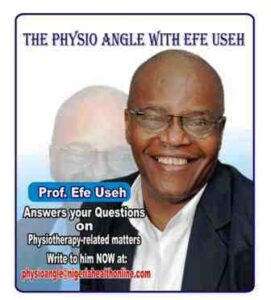My father shakes, will he ever improve?
-
Prof. Useh says it’s Parkinson Disease symptoms, he will improve so, seek help
I am writing this on behalf of my father, a 68-year-old retired policeman who lives in Benin, Edo State. He complains of shaking of both hands which started over three years ago. The shaking started with the fingers and now moved to the upper arms above the elbow. He also walks very slowly with a quick short and shuffling gait. My father finds it very difficult to hold things and keeps his food in his mouth. He does not allow us to feed him but enjoys watching TV. We found out that he forgets the names of people and places he had been to. He has fallen a few times in the compound with near misses. We are so scared he might fall when no one is in and break his bones or even his head. We have seen several doctors and physiotherapists. We were told he had Parkinson’s Disease. He improves during outpatient hospital visits and relapses upon default. His signature has changed and his banking transactions are now affected. We are very worried, embarrassed, and concerned. The last physiotherapy session was about a month ago when he was being taught how to walk again and do coordination exercises. Will he ever improve? Please help.
Yours
Friday, Benin city
Dear Friday,
Your father presents with the symptoms of Parkinson’s disease. This is a progressive neurological disorder that starts slowly and affects movement. During the earliest stages, your father might have experienced mild tremors in his hands or fingers. It is also likely that he will experience muscle stiffness, present with a stooped posture and loss of automatic movements such as blinking, smiling, or swinging his arms as he walks, and/or some soft speech changes etc. This brain disorder which affects the nervous system also causes gradual loss of muscle control. The disease progression is usually slow but might worsen over time.
The symptoms vary from person to person; however, the most common signs of the condition are tremors or shaking of hands. Most people in the early stages of the disease will develop a tremor on one side of the body, typically in the hand or foot but sometimes in the jaw or face. The shaking of hands and legs can sometimes occur after engaging in exercise or a task or at rest. We have had prominent and global icons suffer from similar conditions. They were also able to lead a good life with social and family support. Our great Mohamed Ali was one such example. There is therefore no reason to be embarrassed.
You mentioned that your father takes very short steps and walks slowly. Indeed, slowed movement is a feature of Parkinson’s disease. As it progresses, movements that once occurred almost automatically may become slowed, making it challenging and time-consuming to do simple tasks such as buttoning a shirt or brushing one’s teeth. Your father may also find it difficult to walk, causing himto take shorter steps (shuffle) or drag his feet as he walks. The other common symptom is rigid muscles. Most people with Parkinson’s disease will develop some degree of muscle stiffness, particularly in the hands, legs, neck, and trunk. This stiffness is known as rigidity. This is “the inability of the muscles to relax normally.” The rigidity can decrease the body’s ability to function well, causing discomfort and pain in the affected areas. One common sign of rigidity is the inability to swing your arms while walking. Your father may also have trouble writing and signing his signature. His handwriting could become smaller with time. Writing can suddenly become more challenging; he will now begin to write in smaller letters with crowded words. I will strongly recommend that you consult an Occupational Therapist, when you notice the signs of writing difficulty, to asses him and provide appropriate support.
The difficulty in maintaining a balance posture is another common sign of this condition. Your father may also begin to slouch and when he walks it will appear as if he is chasing something in front of him. This is because of impaired balance and coordination. This posture may worsen over time. Parkinson’s disease may also cause a person to sway backward when rising from a chair as it may also make turning or quick movements especially difficult.
Friday, your father’s difficulty with speech is connected with the impairment caused by Parkinson’s disease. Please get the services of a Speech Therapist (there are very few in Nigeria though, (but we can assist with some contacts via your email). The good news is that your father will benefit from cognitive intervention and physiotherapy to assist with coordination, muscle strength, posture, and flexibility. He will be taught how to walk again. Physical exercise has been shown as the non-pharmacological therapy that has generated the greatest benefits for persons with Parkinson’s Disease and in the family environment, not only for preventing the deterioration of disability but also in influencing some non-muscular symptoms.
Best Wishes
EU







0 Comments
No Comments Yet!
You can be first to comment this post!